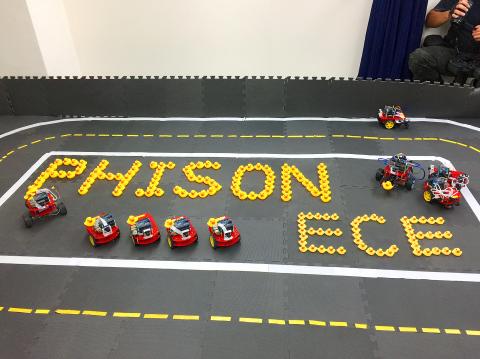Phison Electronics Corp (群聯電子), a designer of NAND flash memory controllers and modules, plans to launch its first controller that uses artificial intelligence (AI) for its next-generation solid-state drive (SSD) next year.
The Hsinchu-based company is joining the ranks of its global semiconductor peers in exploring AI business opportunities to embrace the arrival of the Internet of Things era and the challenge it poses of processing massive amounts of data.
“Nowadays, people receive tons of information from the Internet and social media, like Google or Facebook, that need to be sorted and analyzed, sometimes instantly,” Phison founding chairman Pua Khein-seng (潘健成) said on Tuesday on the sidelines of a news conference for the launch of an AI and robotics lab in Hsinchu.

Photo: Lisa Wang, Taipei Times
“We hope to incorporate AI technology into our products and use it to deal with the complicated job of big-data sorting and analysis. As data traffic is doubling every year, it is increasingly impossible for people’s brains to do the job,” Pua said.
Using AI and machine learning, the company aims to create more “smart” controllers that enable faster data reading and writing speeds than regular SSD controllers, in addition to fixing errors and lowering the error rate, Pua said.
The company has completed the design of it first SSD controller with AI and machine learning, it said, adding that it is set to enter mass production next year.
Since the company’s establishment in 2000, Phison has focused on designing controllers, so it is short of AI engineers and experts to support the expansion, Pua said.
To fill the talent gap and enhance its technological capabilities, Phison is partnering with National Chiao Tung University to launch an AI lab that will develop cutting-edge technologies such as deep reinforcement learning for digital signal processors, he said.
The technology will help develop a new SSD controller that can enable self-repair, accelerate the drive’s reading and writing speeds, and help extend the drive’s lifetime, the company said.
The company has helped raise an initial NT$15 million (US$496,837) for the lab.
“Customer demand in the fourth quarter will be much stronger than in the third quarter. The fourth quarter is the peak season for mobile phone and consumer electronic devices,” Pua said. “The only problem is whether we can source enough flash memory chips [to meet demand]... Supply looks very tight.”
A notification from the world’s major suppliers of NAND flash memory chips, including Samsung Electronics Co and SK Hynix Inc, that prices will be hiked from 15 to 22 percent for this quarter signals strong seasonality next quarter, Phison said.
Therefore, the company expects high demand that will help trigger a rebound in revenue and profit next quarter.
Phison’s net profit for last month declined 17 percent to NT$503 million from NT$604 million in the same period last year, according to a company filing with the Taiwan Stock Exchange on Thursday.
However, cumulative net profit for the first two months of this quarter totaled NT$1.07 billion, up about 3 percent from NT$1.04 billion during the period last year, with earnings per share increasing to NT$5.45 from NT$5, the filing said.

In Italy’s storied gold-making hubs, jewelers are reworking their designs to trim gold content as they race to blunt the effect of record prices and appeal to shoppers watching their budgets. Gold prices hit a record high on Thursday, surging near US$5,600 an ounce, more than double a year ago as geopolitical concerns and jitters over trade pushed investors toward the safe-haven asset. The rally is putting undue pressure on small artisans as they face mounting demands from customers, including international brands, to produce cheaper items, from signature pieces to wedding rings, according to interviews with four independent jewelers in Italy’s main

Japanese Prime Minister Sanae Takaichi has talked up the benefits of a weaker yen in a campaign speech, adopting a tone at odds with her finance ministry, which has refused to rule out any options to counter excessive foreign exchange volatility. Takaichi later softened her stance, saying she did not have a preference for the yen’s direction. “People say the weak yen is bad right now, but for export industries, it’s a major opportunity,” Takaichi said on Saturday at a rally for Liberal Democratic Party candidate Daishiro Yamagiwa in Kanagawa Prefecture ahead of a snap election on Sunday. “Whether it’s selling food or

CONCERNS: Tech companies investing in AI businesses that purchase their products have raised questions among investors that they are artificially propping up demand Nvidia Corp chief executive officer Jensen Huang (黃仁勳) on Saturday said that the company would be participating in OpenAI’s latest funding round, describing it as potentially “the largest investment we’ve ever made.” “We will invest a great deal of money,” Huang told reporters while visiting Taipei. “I believe in OpenAI. The work that they do is incredible. They’re one of the most consequential companies of our time.” Huang did not say exactly how much Nvidia might contribute, but described the investment as “huge.” “Let Sam announce how much he’s going to raise — it’s for him to decide,” Huang said, referring to OpenAI

The global server market is expected to grow 12.8 percent annually this year, with artificial intelligence (AI) servers projected to account for 16.5 percent, driven by continued investment in AI infrastructure by major cloud service providers (CSPs), market researcher TrendForce Corp (集邦科技) said yesterday. Global AI server shipments this year are expected to increase 28 percent year-on-year to more than 2.7 million units, driven by sustained demand from CSPs and government sovereign cloud projects, TrendForce analyst Frank Kung (龔明德) told the Taipei Times. Demand for GPU-based AI servers, including Nvidia Corp’s GB and Vera Rubin rack systems, is expected to remain high,